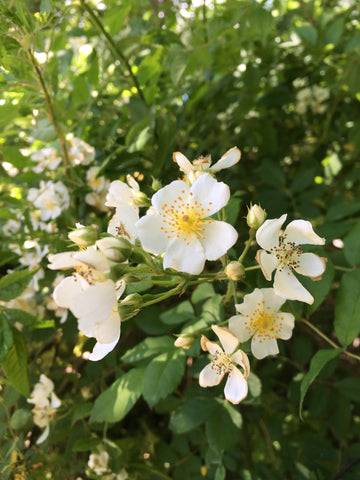We are living in pretty stressful times.
In addition to all the things going on in our daily lives, I think most of us can agree that things feel a little too extra lately. It seems as though a new crisis or disaster or injustice surfaces every other day. It's easy to feel overwhelmed, anxious, powerless, and even to momentarily lose hope.
And for many of us in the northern hemisphere, winter is in full swing. While the light is steadily growing outside, we still face long nights and harsh weather. It's very normal to feel sort of down at this time of the year, and we need to make sure we give ourselves a little extra care.
Things like giving yourself space and grace when you need it, being with people you love, cooking nourishing meals, and spending time in nature all go a very long way toward keeping the heart and mind healthy and calm.
I truly believe that just being around plants, any plants, is restorative to the spirit. Even in the depths of winter, I love to keep a few house plants around - a big pot of peppermint and lemon balm, a gorgeous fern, or even a little ivy plant help to really cheer things up. (So, if you've been feeling down, consider this permission to go on a shopping spree at your local nursery!)
There are many herbs that can support us in difficult times by keeping our heart calm and our mood lifted. The ones I'll share here are a few of my favorite allies to turn to when I'm feeling stressed and overwhelmed.
Herbs to Calm the Nerves and Relieve Stress
Lemon Balm (Melissa officinalis)
This member of the mint family is easy to distinguish; just rub a leaf between your fingers and a light, fresh, lemony scent is released. Its name, Melissa, derives from Greek and means "bee leaf." If you plant lemon balm in your garden, it will be humming with bees in no time! (Another bonus: it's very hardy and easy to grow, even in my shady, rocky garden!)
This beautiful herb can help to calm the nerves, cool the head and lift the spirits. It is traditionally used to to soothe anxiety and depression (especially seasonal depression). It eases the digestive system, is antispasmodic, and has a very mild sedative action.
Herblore says that mothers loved the relaxing effects of Melissa so much that they began to name their daughters after it!
Although a tincture or glycerite works in a pinch, a really lovely way to enjoy lemon balm is as a tea - the refreshing citrus taste is an instant mood booster in itself!
Lavender (Lavandula spp.)
Odds are if you have any bath salts, room sprays, or aromatherapy rollers that are meant to help with relaxation, lavender is a main ingredient. It's almost like the poster child of relaxing herbs.
The scent of the pale purple flowers alone can reduce stress for most people. Adding a few drops of the essential oil to a warm bath or mixing it into a body oil is a great way to show yourself a little love and unwind after a hard day.
When taken as a tea lavender acts as a gentle, warming nervine and digestive aid that helps to dispel pent-up tension.
Lavender can be very overpowering on its own, so its best when mixed with other herbs in a tea blend.
Peppermint (Mentha piperata)
Peppermint is so common that people often overlook it. A hardy, easy to grow plant, it will take over a space when given a chance - make sure you plant it where you don't mind it spreading!
A cooling, refreshing herb, peppermint helps to settle an upset or nervous stomach. An antispasmodic, it relives tension in the gut, helping to calm cramping and indigestion. It also helps to release tension in the shoulders, neck and head.
If you feel your muscles tightening or your stomach getting a little churned up from stress, try making yourself a strong cup of peppermint tea.
Sweet Leaf (Monarda fistulosa)
I truly deeply love this gorgeous wildflower. It blooms from mid to late July in my region; every year I look forward to the way it colors the meadows with big splashes of soft purple. It has a strong, vibrant scent and flavor similar to oregano, and hummingbirds seem to love it.
A cooling herb with antiviral properties, sweet leaf, also called bee balm, is sort of similar in its action to lemon balm - it calms a hot head and soothes a bad temper. When I drink sweet leaf infusion, I often think I can feel the heat leaving my body. The world gains a little more clarity and the emotional storm clouds begin to part. Sweet leaf helps you to see the beauty in the world.
Sweet leaf can be taken as a tincture, but the soothing aroma of the tea goes a long way toward feeling calm and collected. The leaves also make a good potherb and are a nice addition to salads and pasta dishes.
Passionflower (Passiflora incarnata)

Passionflower, to me, is the patron saint of getting a good night's sleep. It's a wonderful ally in those moments when you feel anxiety coupled with circular, racing thoughts. You know, those ones that wake you in the middle of the night and nag at you. It's gentle but effective.
The dried leaf and flower make a tasty tea, but I find the tincture works just as well (and is easier to reach for in the middle of the night when you can't sleep!)
German Chamomile (Chamomila recutita)

Chamomile is often thought of as a gentle sleep aid - scan any box of tea that claims to help you relax and sleep well, and odds are it's at the top of the list of ingredients. While it's true that chamomile is a lovely, tasty drink to have before bed, most tea bags contain such a small amount that you may never have noticed a real effect.
A gentle nervine with stomach-soothing and cold-fighting actions, chamomile is a very powerful herb when brewed correctly.
While it might have a more bitter flavor than many are used to, steeping a couple of teaspoons of the whole dried flower for 15 minutes or longer can have a deeply relaxing and sedative effect, calming tension in the gut and throughout the nervous system.
Herbs for the Physical Heart
The connection between the physical heart and our emotions is strong. Our brains may process what we see and hear and feel, but our hearts are the deep, electric centers of our being. When our hearts are working well, our minds feels much more calm and our whole nervous system is more at ease.
Hawthorn (Cretaegus spp.)
The white blossoms of the Hawthorn tree open in May, the delicate flowers a contradiction to the sharp thorns protruding from its branches. In fall, tart, red, antioxidant-rich berries form.
Hawthorn is a fierce, strong plant that can help you through the deepest heartache and grief. Spiritually, it helps to pull the thorns from your heart so that it can recover from the deepest wounds. It brings a feeling of protection, solidity, and surety.
An astringent herb, hawthorn helps to tone and strengthen the cardiovascular system and heart muscle. It supports a strong, even heartbeat.
A daily dose of hawthorn can go a long way toward supporting a healthy heart and resilient spirit. The leaf and flower can be used to make an infusion, and the berries are often taken as a tincture.
Linden (Tilia spp.)
The first time I drank fresh Linden flower tea, it was a warm moonlit night right at the start of summer. I harvested the fragrant greenish white flowers in the morning and made an infusion which I let steep all day. Before bed, I poured the golden brew over ice. As I drank it I felt a coolness come over me and a deep sense of calm. I could feel the worry draining out of me like a smooth clear river. I fell asleep, the moon shining in my window, and had the sensation that I was laying in a pool of its silver light. Few times in my life have I felt so held, calm and peaceful, and I will never forget that experience.
On a physical level, this beautiful tree with heart-shaped leaves opens up circulation around the heart, helping it to beat with more ease. This makes it an excellent herb to use long term for heart health. It helps to calm the body, relaxing restless muscles and helping to release tension.
Although fresh linden flowers can't be beat (in my opinion) they are only around for a very short time - a few days in early summer, to be exact. Thankfully, linden is readily available dried and still makes a lovely infusion. For the best results, I like to make an infusion of about 1 ounce of herb to 1 quart water, and let it steep at least 8 hours before drinking.
Motherwort (Leonorus cardiaca)
Motherwort is my closest ally, and probably the plant that I rely on the most. Like a kind mother, it reaches into your heart and helps you relax. It brings a warm cloak of courage, self assurance, and clear thinking - exactly what we need when anxiety threatens to overwhelm us.
I've found motherwort especially helpful when uncertainty and worry are keeping you awake, or waking you up in the middle of the night. Taking a dropperful of the tincture is like having a friend there to calm you down, tell you you're worrying too much about nothing, and help you get back to a nice sound sleep.
Motherwort helps the blood to flow easier and improves circulation, breaking up clots and helping the arteries to stay clear. It soothes the heart and regulates its beat - in fact, it is considered a specific for rapid or irregular heartbeat.
As motherwort is an extremely bitter plant, I don't recommend the tea! I find a tincture of the fresh plant is a great way to work with this herb.
Rose (Rosa spp.)
Close your eyes and picture the soft folds of the rose, its delicate petals holding the morning dew. The deep, sweet, unmistakable scent.
Just conjuring the memory of rose can lift the spirits and help you to let go of that tension you feel in your chest when you're worried. She softens the heart and opens it up. If you're feeling closed off and apprehensive, rose can help you to let your guard down and accept help and love from those around you.
An astringent plant, rose makes a good tonic for the heart, tightening and toning tissues and muscles over time.
There are many species of rose, all of which have similar medicinal properties, but I like to work with Multiflora, a scrappy, white-flowered invasive that blooms in early June. (I've written a separate post about it, which can be found here.)
A tincture or glycerite of the fresh flowers is ideal to have on hand, but even a simple tea brewed with dried petals can have a wonderful effect.
If you're feeling a bit down, stressed, and spread thin this month, consider giving one (or more) of these herbal allies a try - remember that the plants are always here for us.
Be well,

All information herein is strictly for educational purposes and has not been verified by the FDA. It is not intended to diagnose, treat, prevent or cure any disease.









